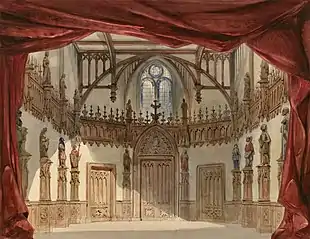Les Burgraves
Les Burgraves is a historical play by Victor Hugo, first performed by the Comédie-Française on 7 March 1843.[1][2] It takes place along the Rhine and features the return of Emperor Barbarossa. The play failed commercially and was the last of Hugo's plays to be produced in his lifetime.[3] It was the subject of an orchestral overture by the composer Guillaume Lekeu in 1890.

Set design by Charles-Antoine Cambon and Humanité René Philastre for the second act in the première production of Les Burgraves
The play is associated thematically with Hugo's Le Rhin, an essayistic book about the Rhine; both were inspired by a trip along the river Hugo took with Juliette Drouet.[4] Les Burgraves was published with a preface indicating that its depiction of a united Germany was part of a larger vision of a united Europe in which France would play a central role.[5]
References
- Robb, Graham (1999). Victor Hugo: A Biography. New York: W. W. Norton. p. 231. ISBN 0-393-31899-0.
- Frey, John Andrew (1999). A Victor Hugo Encyclopedia. Westport, Connecticut: Greenwood Press. p. 42. ISBN 0-313-29896-3.
- Frey, John Andrew (1999). A Victor Hugo Encyclopedia. Westport, Connecticut: Greenwood Press. p. 41. ISBN 0-313-29896-3.
- Affron, Charles (1971). A Stage For Poets: Studies in the Theatre of Hugo and Musset. Princeton, New Jersey: Princeton University Press. p. 66. ISBN 0691062013.
- Metzidakis, Angelo (1994–1995). "Victor Hugo and the Idea of the United States of Europe". Nineteenth-Century French Studies. 23 (1/2): 72–84. JSTOR 23537320. Retrieved 21 October 2020.
This article is issued from Wikipedia. The text is licensed under Creative Commons - Attribution - Sharealike. Additional terms may apply for the media files.